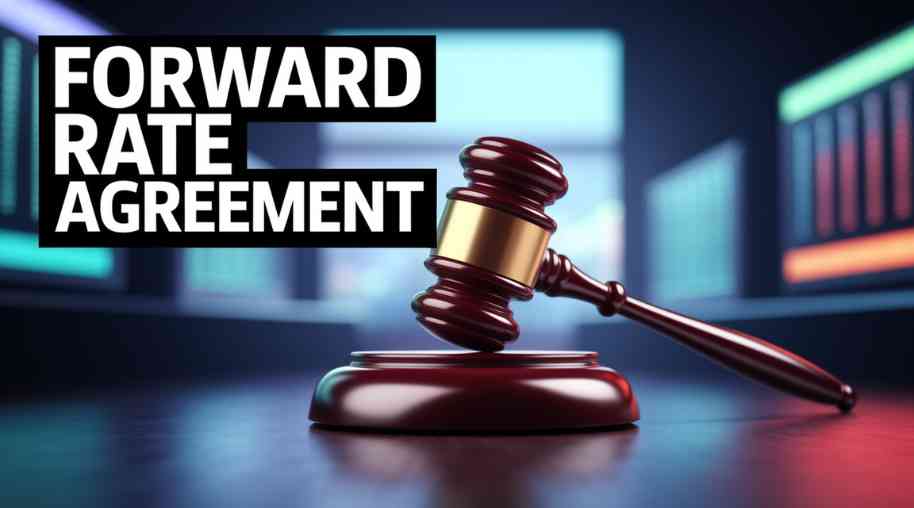FRA Full Form-Forward Rate Agreement
by Shashi Gaherwar
0 2526
Forward Rate Agreements (FRA): Managing Interest Rate Risk
Forward Rate Agreements (FRA) are financial derivatives that allow parties to lock in an interest rate for a future period. These agreements are widely used by banks, financial institutions, and corporations to hedge against interest rate fluctuations.

This article explores the mechanics, benefits, and risks associated with FRAs and their role in financial risk management.
What is a Forward Rate Agreement (FRA)?
A Forward Rate Agreement (FRA) is a contract between two parties to settle the difference between a pre-agreed interest rate and the market rate at a specified future date. The settlement is made in cash based on a notional principal amount, which is not exchanged. FRAs are primarily used to hedge against interest rate risk or to speculate on future interest rate movements.
Key Features of an FRA
- Notional Principal: The underlying amount on which interest calculations are based (not exchanged).
- Contract Period: The duration for which the FRA applies.
- Reference Rate: Typically based on interbank lending rates such as LIBOR or SOFR.
- Settlement Date: The date when the FRA is settled.
- Cash Settlement: The difference between the agreed and prevailing interest rates is paid in cash.
How Do Forward Rate Agreements Work?
The working mechanism of an FRA involves the following steps:
- Agreement on Terms: Two parties agree on the notional principal, contract period, and the fixed interest rate.
- Market Interest Rate Fluctuations: Over time, market interest rates change based on economic conditions.
- Settlement at Maturity: On the settlement date, the FRA is cash-settled based on the difference between the agreed rate and the prevailing market rate.
For example, if a company expects interest rates to rise in three months, it can enter into an FRA to lock in the current rate. If rates increase, the company receives a payment compensating for the higher borrowing cost.
Benefits of Forward Rate Agreements
- Interest Rate Risk Management: Protects against adverse interest rate movements, ensuring predictable financing costs.
- Cost-Effective Hedging: Unlike interest rate swaps or futures, FRAs do not require upfront margin or collateral, making them cost-effective.
- Flexibility and Customization: Tailored in terms of notional amount, contract period, and settlement dates, offering flexibility compared to standardized futures contracts.
- No Principal Exchange: Limits counterparty exposure to the net settlement amount.
Risks Associated with Forward Rate Agreements
- Market Risk: Unfavorable interest rate movements may result in losses, especially for speculative FRAs.
- Counterparty Risk: As over-the-counter (OTC) derivatives, FRAs expose parties to credit risk if one party fails to meet its payment obligation.
- Lack of Liquidity: Compared to exchange-traded derivatives, FRAs have lower liquidity, resulting in wider bid-ask spreads and difficulty exiting positions.
FRA vs. Interest Rate Futures
- Trading Platform: FRAs are traded over-the-counter (OTC), offering customization but higher counterparty risk. Interest rate futures are exchange-traded and standardized, with lower risk due to clearing house guarantees.
- Liquidity: Futures markets typically have higher liquidity compared to the OTC market for FRAs.
- Flexibility: FRAs allow tailored terms, while futures are less flexible due to standardization.
Real-World Applications of FRAs
- Banks: Manage interest rate risk on loans and deposits.
- Corporations: Hedge borrowing costs for future debt issuances.
- Investors: Speculate on interest rate movements to earn arbitrage profits.
Forward Rate Agreements (FRAs) are essential financial instruments for managing interest rate risk. They provide flexibility, cost-effectiveness, and tailored solutions for businesses, banks, and investors. However, market and counterparty risks must be carefully assessed before engaging in FRA transactions. By understanding the mechanics and benefits of FRAs, financial professionals can optimize their risk management strategies.
Further Learning Resources
If you’re passionate about building a successful blogging website, check out this helpful guide at Coding Tag – How to Start a Successful Blog. It offers practical steps and expert tips to kickstart your blogging journey!
For dedicated UPSC exam preparation, we highly recommend visiting www.iasmania.com. It offers well-structured resources, current affairs, and subject-wise notes tailored specifically for aspirants. Start your journey today!

Share:









Comments
Waiting for your comments